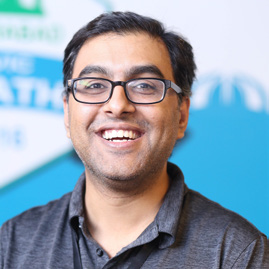Why we must Trust the Process
At Code for Pakistan, we are building a non-partisan civic innovation ecosystem to improve the quality of life across Pakistan. We aim to transform the relationship between the government and citizens by leveraging technology to bridge the gap between the two. However, considering the unpredictable state of 70-year-old Pakistan, it is not easy to answer where the country should be in the next 10 years. Irrespective of what visions the government may have set out, be it Digital Pakistan or Vision 2025, we believe only concrete processes will sail us through. It is by solidifying and building improved processes rather than focusing on temporary outcomes that we can ensure a stronger government and sustainable development. These processes will bring certainty to the future we desire and deserve.
In Pakistan, trust in institutions in general, and in government in particular, has been on the decline. This presents challenges to proposing a focus on processes, as citizens tend to care only about outcomes — such as poverty reduction, service delivery, etc. With episodes like Panamagate, Pakistani society will continue to increasingly indulge in pessimism and mistrust of its elected leaders. Beyond a certain threshold, such pessimism serves as a cancer for society.
Thankfully, with Pakistan joining Open Government Partnership (OGP), we see great potential for the country to become a modern political and socioeconomic entity: promoting participatory processes, improving transparency and access to open data, and strengthening accountability via policies and laws.
For the last four years, Code for Pakistan has been rallying to bridge the gap between government and citizens. In addition to co-authoring OGP commitments with the government, Code for Pakistan runs the KP Civic Innovation Fellowship Program in partnership with the World Bank and the KP IT Board, a program that brings together 20 full-time citizen technologists and five government departments to improve government service delivery. It is the trust in each other that has helped us run the program for three years, and we hope to expand the Fellowship Program to the national level soon. One of our most successful applications is the KP Traffic police app which enables traffic wardens to report traffic incidents and violations in real time. According to the Traffic Department, the application has saved the government $100,000 while reducing corruption and increasing transparency.
This is just one example of what we can achieve together. Through our work, we have learnt that there are four principles critical to the success of Pakistan’s participation in OGP:
1. Keeping the Public Informed
Joining OGP is the easy part. Achieving an open and participatory government is a continuous struggle and all stakeholders must brace for increased societal skepticism. However, by keeping the public informed about the commitments and the process, we can hope to instill trust among key stakeholders. We should not expect everyone to understand why processes are more important than outcomes in the long run, but if we stick to the processes long enough and with a sense of urgency, we should have a chance to produce a few good outcomes.
2. Data-Driven Approach
It is imperative to make data an integral part of the processes.
There should be surveys conducted to benchmark where society stands on trusting the government. It’s also important to benchmark where different groups of stakeholders stand, be it academic, businesses or the media. Without a data-driven framework, we may not be prioritizing the right policy areas for reform or measuring the progress made in recovering trust in the government.
3. Alignment with Political Will
We are assuming that international praise on OGP commitments is highly desired by those who are involved with the process in Pakistan. Nevertheless, it is expected that the government will be cautious about several of the OGP commitments because the elections are just 10 months away. However, if civil society can show government that we are supportive of its positive efforts, there may be alignment of political will around the commitments. We might even witness election campaigns around Open Government slogans.
4. True Multi-Stakeholder Approach
If there is one OGP principle we need to go big on, it is public participation. This will encompass multistakeholder representation in all aspects of governance, from initial dialogue to making decisions to actual execution. We may not always have consensus, but if there are more groups represented when decisions are made, we will hear more voices, ensure representation, and hopefully set the country on a path where trust will eventually come naturally.
Now that Pakistan has become a member of OGP, it is imperative that continuous efforts are made to strengthen processes, engage the public, and eventually improve service delivery to meet citizens’ needs. OGP is a platform that Pakistan must embrace and utilize to recover the trust that has been eroded over decades of military rule, poverty, and lack of citizen empowerment.
Many thanks to Meera Nadeem, Anam Zakaria, and Adnan Shafi for contributing to this article.
 Asim Ghaffar
Asim Ghaffar
President of Code for Pakistan
@shaghab
 Sheba Najmi
Sheba Najmi
Founder & Executive Director of Code for Pakistan
@snajmi
Get social and spread the word:
 .@shaghab and @snajmi underscore the #opengov principle of citizen participation to #RenewTrust http://bit.ly/2y6fhpp
.@shaghab and @snajmi underscore the #opengov principle of citizen participation to #RenewTrust http://bit.ly/2y6fhpp
